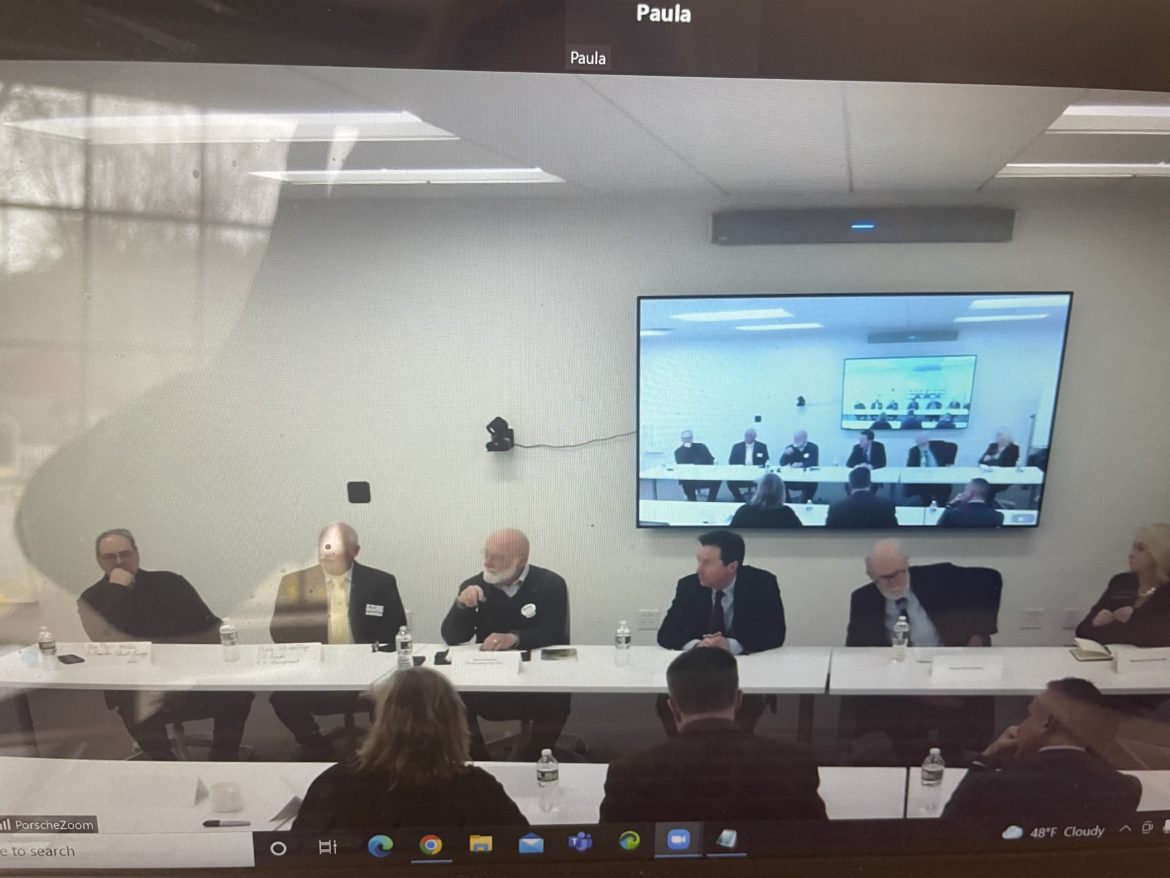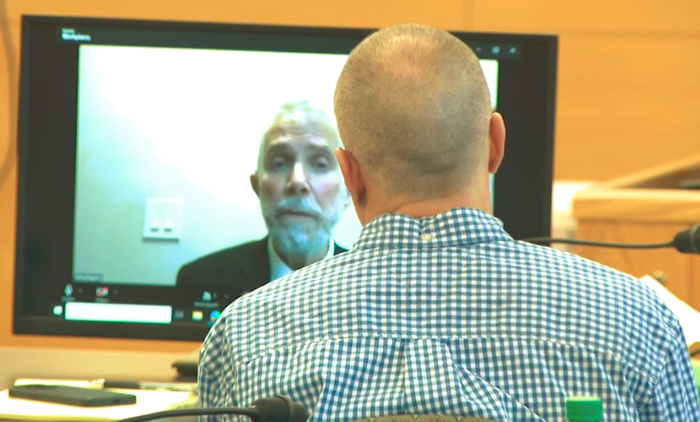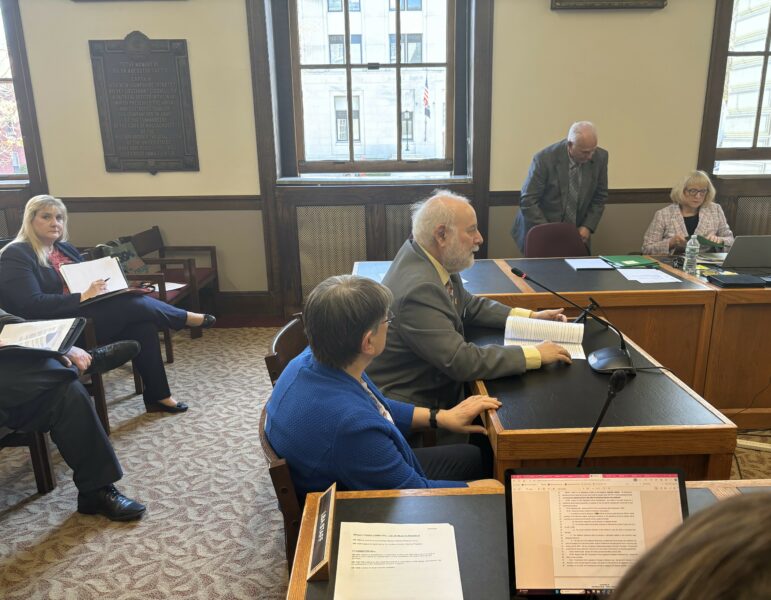By PAULA TRACY, InDepthNH.org
STRATHAM – New Hampshire government did not lead businesses through COVID-19, nor did legislators have their back on issues related to requiring employee vaccinations, Seacoast area business leaders charged at a roundtable discussion here Thursday.
And it is not getting any better with a slew of new bills coming to the Senate next week that could bind the arms of business owners by letting employees opt out as a matter of “conscience,” state Sen. Tom Sherman, D-Rye warned.
Sherman, who is running for governor, and other top Seacoast Democrats listened and participated in the roundtable hosted by Marshall Jespersen, chief executive officer of International Cars LTD Inc.
He is the owner of six car dealerships in New England with more than 100 employees.
The pandemic was “a tough time, but the thing that was the toughest in New Hampshire was we did not have the kind of real support from our government,” Jespersen said. “Rather than saying ‘we are in it for the public good,’ it became political with some saying ‘you don’t need to do it,'” related to vaccinations.
“It absolutely hurt people,” he said.
Jespersen said he ended up having to lose 12 employees who would not agree to the company’s decision that for the health of everyone, they needed to be vaccinated.
He noted one got vaccinated then got COVID-19 and then came back and thanked them for requiring it, saying it could have been a much worse case of COVID-19 which could have killed him.
Jespersen said while no employees have died, relatives of people who did work there did die.
The roundtable also involved a discussion of how the state was emerging from the pandemic which has killed 2,457 residents and made ill 303,472 as of Thursday’s statistics.
The gathering included a discussion on energy policy and business concerns.
State Sens. Sherman, and David Watters, D-Dover, and Rep. Debra Altschiller, D-Stratham, discussed issues related to legislation and policy, which was also available virtually from the dealership in Stratham.
Jespersen described the first help the state provided which was in the form of personal protective equipment.
That he said was a “Godsend.”
Once the public was able to get vaccinations, it became less a matter of leadership and more about the business doing everything it could to comply with CDC rules and do what customers wanted.
“Customers didn’t stop driving,” Jespersen said, and they didn’t stop getting into accidents requiring new vehicles. But selling cars got complicated “when you can’t take someone on a test drive. We would pick up and deliver cars.”
As they were getting vaccines, there was a group of about 70 employees that resisted that, Jespersen said.
“It was frustrating,” he said, “people (were) more political about what was going on than paying attention to the science. We did everything we could to encourage our people to get vaccinated.”
There were little contests with $50 gift cards but all that stuff did not move the needle much.
The Biden Administration floated proposed rules to require vaccinations for employers of more than 100 but that got caught up in the courts and was largely opposed by Republicans.
Jespersen said his board of directors discussed values and taking their own action.
They agreed that a vaccine mandate would be required to continue work and gave people about a month and a half to comply.
He said he went around and talked to every one of the employees and found they did not have good information or had gone to their doctor.
At least, he said, there was a conversation-starting point from those discussions and that while they ended up losing 12 “we did not want to lose any one of them but this is what we needed to do.”
In some instances they went to other dealerships, he said.
“It was a terrible place to be,” Jespersen said as an employer, “to have to give a directive that you have to do this or get fired is never a place you want to be,” but it had to be done “for the safety of our customers.
He said the legislature was not helpful.
Jespersen said he discussed it with his legislator, and Rep. Altschiller suggested he write up his concerns and present them. Thus, Thursday’s panel was convened.
Sherman noted that he occupied a unique position in the pandemic as both a senator and a medical provider in Exeter, though he is now retired.
He said he understood Jespersen’s concerns about a lack of leadership.
“We are about to get a slew of bills next week that will take away what you did to save your business,” Sherman said, noting House bills that have passed are coming to the Republican-controlled Senate with measures to take business owners’ rights to terminate those who refuse the vaccine.
These bills with “conscience” loopholes are not supported by Republican Gov. Chris Sununu. But he has not stated whether or not he will veto them until the bills are finalized.
Sherman noted that it has been the Democrats who have said the state should not be telling businesses what to do with their employees and leaving the decision over masks and vaccinations to the business owners.
In early August, he noted the rise of the Delta variant. The state knew how dangerous and deadly this strain was and he recalled speaking with Commissioner of Health and Human Services Lori Shibinette who told him she had a mobile van but not the real resources to combat the emergence of Delta.
And it would be another three-month delay to get boosters and emerging childhood vaccines in arms because of the Republican’s political delay at both the Executive Council and the joint legislative Fiscal Committee which bowed to anti-vaccination protesters, eventually approving $27 million in federal funds but at a delay which likely cost lives, Sherman said.
The money was “ratified in November as people were dying of Delta,” he said.
“Right now, we are still doing almost nothing. Think of it. People don’t want to hear about COVID,” he warned, but there is a danger.
“We better be prepared,” he stressed. “It doesn’t have to be in the paper every day, but we better be ready.”
Sherman said the business community is leading the charge.
“We have to make sure our economy is able to stay afloat,” Sherman said. “Let’s not take away businesses’ right to protect their employees, customers, and as important the business of New Hampshire.”
Sherman said the business community should tell legislators that the bills are unacceptable.
He said there was a chance that some efforts could modify legislation or kill it but noted that an outright killing of bills could lead to a return in another form from the other chamber.
Other business operators who worked in Massachusetts during the pandemic said it was easier to be able to lean on state requirements of vaccinations there rather than in New Hampshire.
One said they would like consistency between states and noted New Hampshire has fallen behind other states.
Watters, who has been a champion of renewable power and energy bills for decades, said he tends to be a pragmatic Yankee and he said he found that the pandemic brought out the character and importance of collaboration among business and community leaders.
Watters said the strength of the state is in its small and connected communities and that has helped the state move forward from the pandemic and into growth potential including renewable opportunities.
“Yes we are behind,” he said in renewable growth, but he said there has been a lot done under the radar that will lead us to a more renewable energy future.
Watters said there are infrastructure investments coming and a study on offshore wind in the Gulf of Maine, among others, has great promise for new jobs and a new economy.
But he said there is a real distrust for government, science, education, and now for non-profits among those in Concord and their supporters.
“I want to listen to these folks,” he said. “I want to know why they feel so disaffected,” he said.
“We have to be positive about these things,” Watters said. New jobs, and potential for them, are a way to get away from partisan politics and focus on something that all can agree on.
Watters said he thinks that the Republicans in power, including Sununu, are now focused on housing needs and that is a good thing.
But some business leaders attending said the problem is at the local level and the focus is on local property taxes.
Others attending the roundtable, including Jennifer Wheeler of the Exeter Area Chamber of Commerce, talked about collaborations that developed during the pandemic and working together with other businesses to be one community.
Wheeler said the Exeter community asked the governor for mask mandates statewide and found that locally things could be enacted and were enacted. But the polarization was there politically.
“We saw the political divide between businesses where masks were not mandated and those that were,” Wheeler said.
Paul Hodes, a former Democratic congressman now a consultant in renewable energy, said New Hampshire used to be a place where there was common sense and political statesmanship.
Hodes said he served on two interesting boards during the crisis, one of which was as the New England representative to the National Council on the Arts.
Hodes said overall the Arts represent 4.3 percent of the gross domestic product, larger than the transportation and construction sectors. But during COVID-19 there was a “white-out” throughout the art world and the industry had to pivot to deal with the pandemic in order to save themselves from extinction.
Good news, Hodes said, he found that charitable contributions increased and more people have wanted to patronize arts than before.
He talked about the power of business to influence policy.
Sherman concluded the roundtable by saying that there are lessons to be learned from the pandemic, but he doubts this current legislature to be the leaders needed and businesses need to engage at the state level to lead change.
“I am afraid it is going to have to come from somewhere else because right now this legislature is going to make it harder for businesses to survive if there is going to be another pandemic. I would not wait for this legislature to create that leadership,” Sherman said.





